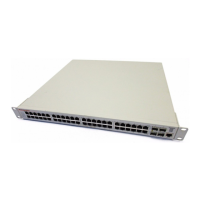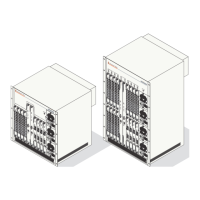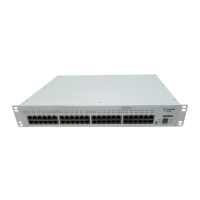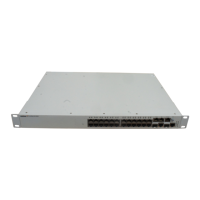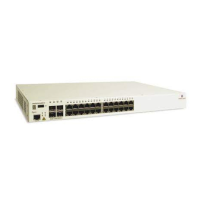Do you have a question about the Alcatel OmniSwitch 6624 and is the answer not in the manual?
Overview of the Chassis Management Module (CMM) and its role in troubleshooting.
Steps to verify the overall health of the switch by checking CMM and NI status.
Details on using systrace for diagnosing problems by tracking system processes.
Using Dshell commands to diagnose task consuming CPU on the CMM and NI.
Diagnosing Inter-Process Communication (IPC) issues, including buffer pools and task analysis.
Documenting how to convert port number parameters between different platform types.
General steps for troubleshooting switched Ethernet connectivity.
Checking link lights and interface status to verify physical layer connectivity.
Verifying the switch's current running configuration for accuracy.
Examining source learning to identify issues with MAC address learning.
Checking switch health to identify variables that might cause forwarding problems.
Checking for ARP problems by verifying static MAC addresses and connectivity.
Analyzing system log files for messages indicating system or interface problems.
Explains the basic process of source learning and MAC address entry.
Verifying physical link, VLAN membership, and MAC address table learning.
Troubleshooting source learning problems related to traffic coming from a port.
Using Dshell commands to verify pseudo-CAM entries for MAC address learning.
Explains the purpose of spanning tree for physical redundancy and dynamic fail-over.
Verifying STP configuration, topology changes, and timers for LAN issues.
Verifying NI health and CMM perspective for STP configuration.
Details on using Dshell commands like stp_help and event traces.
Analyzing CMM Spanning Tree traces using stpCMM_traceprint command.
Key ingredients for troubleshooting: Network Diagram and OSI Model.
Monitoring UDP traffic using debug ip packet protocol udp CLI command.
Using Dshell commands for UDP Relay debug sessions.
Explains the primary function of DNS for name resolution to IP addresses.
Steps to diagnose DNS resolution failures, including IP connectivity and name resolution.
Discusses limitations on domain name entry and number of DNS servers.
Considers limits for static link aggregation groups and NI module optimization.
Verifying configuration of ports and aggregates, and checking spanning tree status.
Troubleshooting link aggregate software recognition of slices and port status.
Lists functions available for Link Aggregation debugging on the NI.
Investigating 802.1Q feature and configuration, and Ethernet connectivity.
Verifying 802.1Q configuration from CMM perspective using debug 802.1q.
Using Dshell commands to verify 802.1Q port configurations.
Checklist for determining the source of VLAN mobility failures.
Verifying port candidacy for mobility and protocol indicator map.
Commands and debugging functions for Group Mobility troubleshooting on NI.
Understanding default behaviors and limitations of QoS.
Steps for gathering information and starting QoS troubleshooting.
Demonstrates creating rules for blocking MAC addresses and traffic shaping.
Troubleshooting ARP resolution failure by verifying MAC address learning.
Lists common conditions that may exist if ARP is not resolved.
Troubleshooting ARP packets by using diagnostic CLI commands.
Troubleshooting ARP cache by using Dshell commands on the NI.
Looking at the ARP table on OS-6600 using Dshell command.
Explains IP Routing function of processing and forwarding Layer 3 packets.
Diagnosing issues where a device cannot get out of the network.
Verifying IP setup of devices in different VLANs and troubleshooting gateway issues.
Using debug ip packet command to view traffic crossing the switch.
Commands used to troubleshoot RIP failures and verify interface parameters.
Commands to troubleshoot OSPF failures and verify interface parameters.
Troubleshooting BGP neighbor operational state and maximum-prefix settings.
Describes how VRRP routers exchange information, including IP and VRRP field descriptions.
Details OmniSwitch 7700/7800/8800 support for VRRP.
Explains VRRP behavior during CMM takeover and hot swap.
Commands to troubleshoot VRRP issues.
Shows the ARP table of the Master Router and illustrates VRRP master switch.
Troubleshooting VRRP flapping by using Dshell commands.
Verifying Layer 2/Layer 3 connectivity and multicast group membership.
Checking if Expiry timer reaches zero or if policies prevent multicast traffic.
Viewing traffic traversing the switch using debug ip packet show-multicast.
Using IPMS application shell to verify specific data displayed on CLI.
Explains DVMRP as a Dense Mode Multicast Routing Protocol for LAN environments.
Verifying IP multicast switching is working properly.
Details commands for checking DVMRP admin status, intervals, and routes.
Using DVMRP debug commands to analyze protocol operations.
Explains PIM-SM architecture for efficient multicast routing in wide area Internets.
Defines key terms like Bootstrap Router (BSR), Designated Router (DR), and Rendezvous Point (RP).
Describes DR Election, Hello Message Format, and Debugging Hello Messages.
Explains the process of electing a Bootstrap Router (BSR).
Describes Candidate-RPs advertisements unicast to the BSR.
Contains RP-SET IP addresses that participate as RP for multicast group.
Explains Join/Prune messages sent by DR to join or prune branches of multicast tree.
Describes how source starts transmitting to multicast group, DR encapsulates data to RP.
Explains shared distribution tree formed around RP.
Explains how DR builds a Shortest Path Tree (SPT).
Covers incorrect BSR ID and limitations like multicast group status.
Brief understanding of Server Load Balancing (SLB) functions.
Identifies SLB failures in complete or partial service.
Describes SLB failures appearing in two forms: complete and partial service.
Loss of connectivity to all servers for all users, verified by pinging VIP.
Traffic distribution rules not adhered to, but cluster connectivity is still present.
Lists commands used for troubleshooting SLB problems.
Steps for gathering information and characterizing a complete SLB failure.
Determining SLB configuration to identify misconfigurations.
Procedure for narrowing down SLB problems on 7700/7800/8800 product line.
Understanding authentication works in the switch and Radius/DHCP server.
Diagnosing DHCP request failures and authentication failures.
Notes on client issues related to telnet authentication manual IP release and renew.
Capturing debug information using systrace commands.
Troubleshooting AVLAN using Dshell commands and AD Debugging Help.
Verifying Radius and Accounting ports, and port configuration for 802.1x authentication.
Using debug ip packet protocol udp command to monitor traffic.
Troubleshooting 802.1X using Dshell commands to verify configurations.
Describes Catalina and Firenze ASICs, their functions and interfaces.
Explains interactions between Queue Driver and other software modules.
Describes how ports are aggregated into groups and Coronado tables.
Details Layer 2 Tables (L2-SA, L2-DA) and Layer 3 Tables.
Explains how Coronado ASIC is an ingress classifier for Layer 2 lookups.
Manages Coronado HRE resources for IP and IPX packet classification and forwarding.
Describes interaction between QoS Manager and Queue Driver.
Explains how Coronado handles packet egress processing.
Describes ASIC switching fabric functionality and backplane connections.
Details Nantucket ASICs' support, specifications, and messages.
Describes Roma ASICs, fabric slices, and SFM elements.
Controls major functionality and synchronization between components.
Explains packet processing principles on ingress and egress.
Details data flow for unknown L2 source, known L2 destination, and unknown L2 DA.
Explains packet processing for unknown L2 Destination and L3 DA.
Key features of OmniSwitch 6XXX stackable version.
Describes CMM functionality for OS6600, including modes and restrictions.
Explains IPC services provided by IPC software interface.
Illustrates the bootup process for OS6600.
Debug commands for 802.1Q.
Debug commands for DVMRP.
Debug commands for IP packet.
Debug commands for DHCP Relay.
Debug commands for Multicast Routing.
Debug commands for OSPF.
Debug commands for PIM-SM.
Debug commands for RIP.
Debug commands for trap.
Lists common and useful VI commands for text editing.
Example of using VI editor to modify the boot.params file.
| Manageable | Yes |
|---|---|
| Jumbo Frame Support | Yes |
| Power Device | Internal power supply |
| Voltage Required | AC 120/230 V (50/60 Hz) |
| Uplink Ports | 2 x SFP (mini-GBIC) |
| MAC Address Table Size | 16K entries |
| Routing Protocol | OSPF, RIP, RIP-2, VRRP, IGMP, PIM-SM, PIM-DM |
| Remote Management Protocol | SNMP 1, RMON 1, RMON 2, RMON 3, RMON 9, Telnet, SNMP 3, SNMP 2c, HTTP, TFTP, CLI |
| Authentication Method | RADIUS, TACACS+ |
| Features | Flow control, VLAN support, BOOTP support, IGMP snooping, DiffServ support, IPv6 support |
| Compliant Standards | IEEE 802.3, IEEE 802.3u, IEEE 802.3z, IEEE 802.1D, IEEE 802.1Q, IEEE 802.1p, IEEE 802.1w, IEEE 802.1s, IEEE 802.1X, IEEE 802.3ad |
| Operating Temperature | 0 - 50°C |
| Storage Temperature | -40 to 158 °F (-40 to 70 °C) |
| Humidity | 10 - 95% (non-condensing) |


